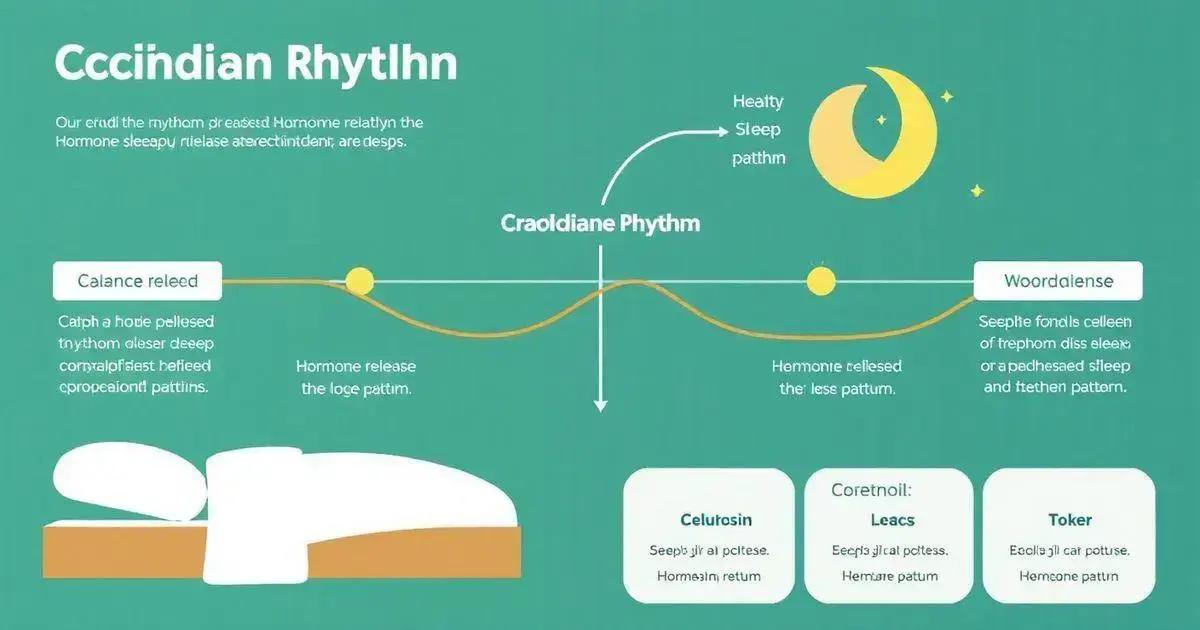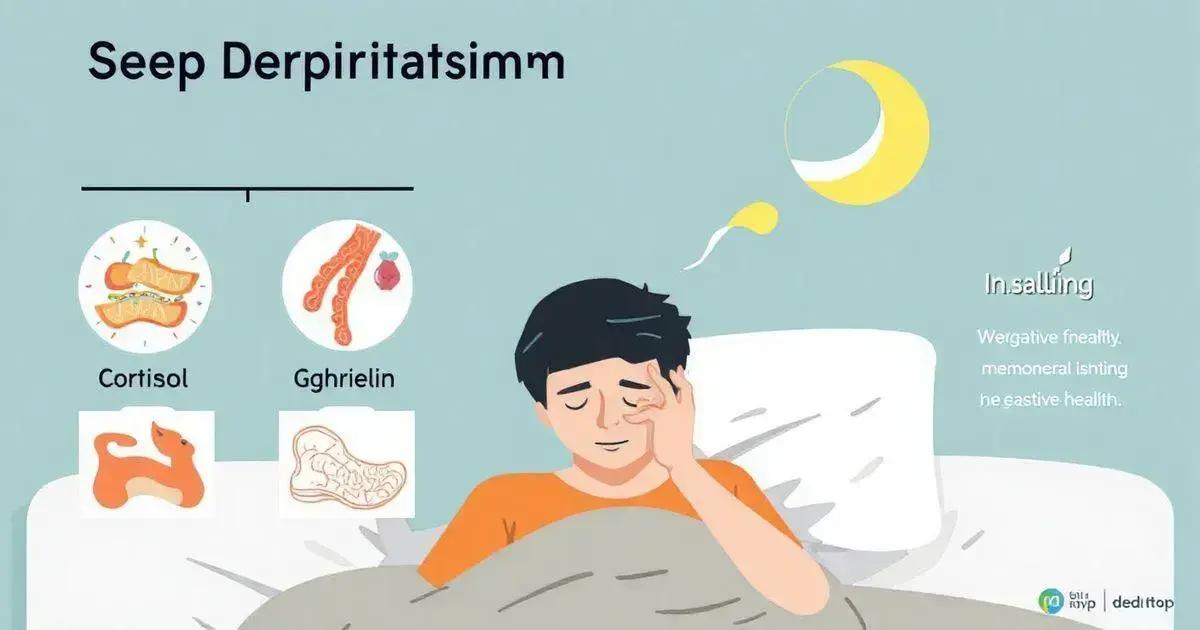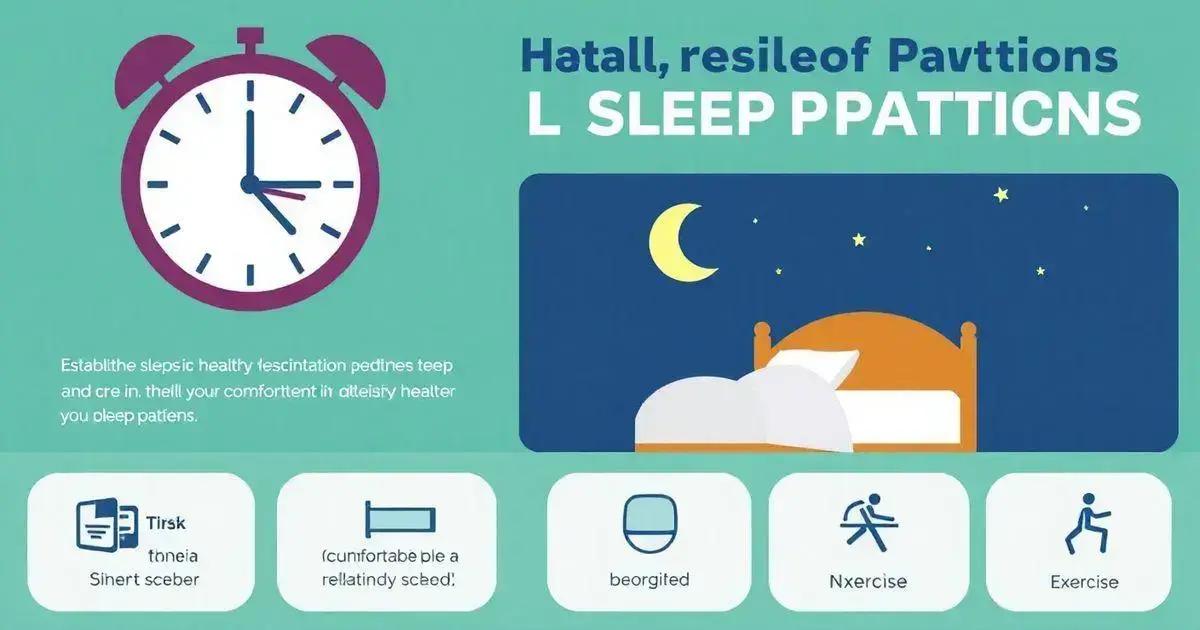The importance of healthy sleep patterns for hormone regulation cannot be overstated; quality sleep helps regulate hormones like cortisol, insulin, and leptin, affecting appetite, stress, and overall well-being. Establishing a consistent sleep schedule, creating a relaxing bedtime routine, and optimizing the sleep environment are key strategies to improve sleep quality and maintain hormonal balance.
Healthy sleep patterns are vital for optimal hormone regulation and overall well-being. Quality sleep does not just rejuvenate the body; it plays a crucial role in regulating hormones such as cortisol and insulin. In this article, we will delve into how sleep affects hormone levels and what you can do to improve your sleep habits for better hormonal health.
Understanding Sleep Patterns and Hormone Regulation

Understanding the connection between sleep patterns and hormone regulation is critical for maintaining good health. Sleep patterns refer to the natural cycles that determine when we sleep and wake up. These patterns are influenced by our internal body clock, known as the circadian rhythm, which regulates various biological processes, including hormone production.
The Circadian Rhythm
The circadian rhythm is a 24-hour cycle that influences our sleep-wake patterns alongside hormone release. Hormones like melatonin and cortisol are affected by this rhythm. Melatonin levels rise in the evening, prompting sleepiness, while cortisol peaks in the morning, helping to wake us up.
How Sleep Affects Hormones
Quality sleep supports the regulation of many hormones, including those that control appetite, stress, and metabolism. Sleep allows the body to refresh itself and produce essential hormones. For instance, lack of sleep can lead to imbalances in ghrelin and leptin, hormones responsible for hunger and satiety, respectively.
Sleep Disorders and Hormones
Various sleep disorders, like insomnia and sleep apnea, can disrupt hormone production. Individuals with sleep apnea often experience reduced oxygen levels at night, which can lead to increased stress hormones and lower metabolic rates.
Maintaining healthy sleep patterns is essential for keeping hormones balanced and ensuring overall well-being. By being aware of how our sleep habits influence our hormone levels, we can take steps to improve our health.
The Effects of Sleep Deprivation on Hormones

Sleep deprivation can have a significant impact on hormone levels in the body. When we do not get enough sleep, it disrupts the natural balance of hormones essential for various bodily functions. For instance, cortisol, known as the stress hormone, can increase due to lack of sleep, leading to higher stress levels and potential weight gain.
Impact on Ghrelin and Leptin
Two critical hormones that regulate appetite are ghrelin and leptin. Ghrelin increases hunger, while leptin signals fullness to the brain. Sleep deprivation can lead to elevated levels of ghrelin and decreased levels of leptin. This imbalance causes more frequent cravings and overeating, which can contribute to obesity.
Effects on Insulin Sensitivity
Moreover, insufficient sleep can affect insulin sensitivity, a crucial factor in maintaining healthy blood sugar levels. When sleep-deprived, the body may become less responsive to insulin, increasing the risk of type 2 diabetes.
Hormonal Imbalance and Mental Health
Additionally, sleep deprivation can impact the production of hormones related to mental health. For example, lower levels of serotonin, a hormone that helps regulate mood, may lead to increased feelings of anxiety and depression.
Chronic sleep deprivation not only affects these important hormones but can also lead to more serious health issues. Addressing sleep needs is essential for maintaining hormonal balance and overall health.
Tips for Establishing Healthy Sleep Patterns

Establishing healthy sleep patterns is essential for good hormone regulation. Below are several effective tips to help improve your sleep quality.
1. Stick to a Sleep Schedule
Go to bed and wake up at the same time every day, even on weekends. This consistency reinforces your body’s circadian rhythm, making it easier to fall asleep and wake up naturally.
2. Create a Relaxing Bedtime Routine
Engage in calming activities before bed, such as reading or taking a warm bath. A relaxing routine signals your body that it is time to wind down, promoting better sleep.
3. Limit Screen Time
Avoid screens—like TVs, computers, and smartphones—for at least an hour before bed. The blue light emitted by these devices can interfere with melatonin production, making it harder to fall asleep.
4. Create a Comfortable Sleep Environment
Ensure your sleeping area is quiet, dark, and cool. Use earplugs, blackout curtains, or a fan to create a serene atmosphere conducive to sleep.
5. Monitor Your Diet
Avoid large meals, caffeine, and alcohol close to bedtime. These substances can disrupt your sleep cycle and make it difficult for your body to achieve restorative sleep.
6. Get Regular Exercise
Engage in regular physical activity during the day. Exercise can help reduce stress and anxiety, making it easier to fall asleep at night. However, try to avoid vigorous exercise right before bedtime.
By following these tips, you can establish a healthy sleep pattern that supports hormone regulation and overall well-being.
Conclusion: Embracing Sleep for Hormonal Balance

Embracing sleep is crucial for achieving hormonal balance and overall health. When we prioritize healthy sleep patterns, we support our body’s natural processes. Good sleep helps regulate hormones like cortisol, insulin, ghrelin, and leptin, which play key roles in appetite, mood, and metabolism.
Awareness of Sleep’s Impact
Being aware of how sleep affects our hormones can motivate us to create better habits. Sleep deprivation can lead to hormonal imbalances that affect our health negatively. Recognizing the symptoms of sleep deprivation is important in taking steps to improve sleep quality.
Long-term Health Benefits
Incorporating healthy sleep into our daily routine is an investment in long-term health. Improved sleep can enhance mental clarity, emotional stability, and physical health. It allows our bodies to recover and perform optimally each day.
Making Sleep a Priority
To embrace sleep truly, we need to make it a priority. Setting up a conducive sleep environment and following the tips mentioned can be a great start. It’s essential to understand that restful sleep contributes significantly to our well-being and life quality.
Overall, committing to regular, restful sleep patterns can help us lead healthier lives and maintain hormonal balance. With dedication to our sleep health, we embrace better living and improve our quality of life.
In Conclusion: The Importance of Healthy Sleep Patterns
Prioritizing healthy sleep patterns is essential for maintaining hormonal balance and overall well-being. Quality sleep allows the body to regulate hormones effectively, which influences our mood, appetite, and health.
By understanding the connection between sleep and hormone regulation, we can recognize the significance of establishing good sleep habits. Implementing practical tips for better sleep, from maintaining a consistent sleep schedule to creating a comfortable sleep environment, can lead to profound improvements in our health.
Embracing sleep as a vital component of our lifestyle not only enhances our physical health but also promotes mental and emotional stability. Committing to sleep health encourages a balanced life, enabling us to thrive in our daily activities.
Let us acknowledge the power of sleep and make it a priority in our quest for healthier living.
FAQ – Frequently Asked Questions about Healthy Sleep Patterns and Hormone Regulation
Why is sleep important for hormone regulation?
Quality sleep helps regulate hormones like cortisol, insulin, ghrelin, and leptin, which are essential for appetite control, stress management, and overall well-being.
How can I improve my sleep quality?
You can improve your sleep quality by sticking to a consistent sleep schedule, creating a relaxing bedtime routine, limiting screen time before bed, and ensuring a comfortable sleep environment.
What are the effects of sleep deprivation on my health?
Sleep deprivation can lead to hormonal imbalances, increased stress levels, weight gain due to overeating, and impaired insulin sensitivity, which can increase the risk of chronic health issues.
How does sleep affect appetite and weight?
Lack of sleep increases ghrelin levels (hunger hormone) and decreases leptin levels (satiety hormone), leading to increased appetite and a higher likelihood of weight gain.
What are some tips for creating a healthy sleep environment?
To create a healthy sleep environment, keep your bedroom dark, quiet, and cool. Consider using blackout curtains, earplugs, or a white noise machine to enhance sleep quality.
How does exercise impact sleep?
Regular physical activity can improve sleep quality by reducing stress and anxiety, but try to avoid vigorous exercise close to bedtime as it may interfere with falling asleep.













